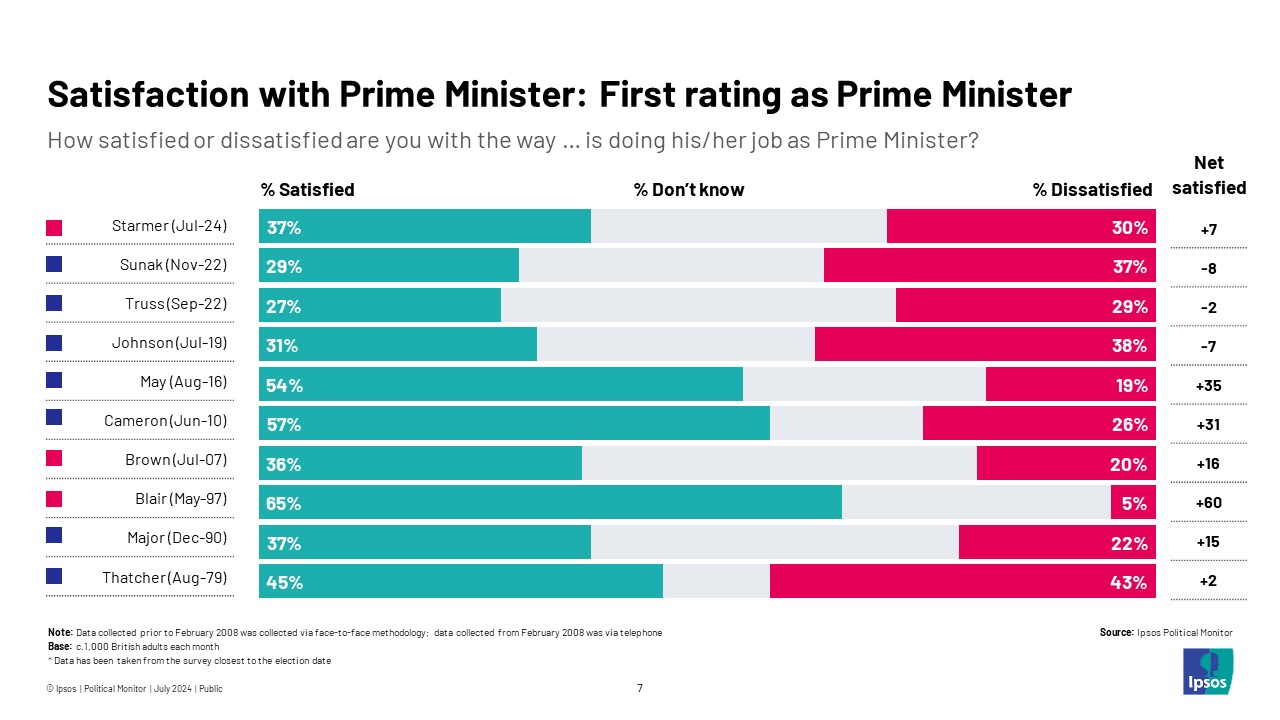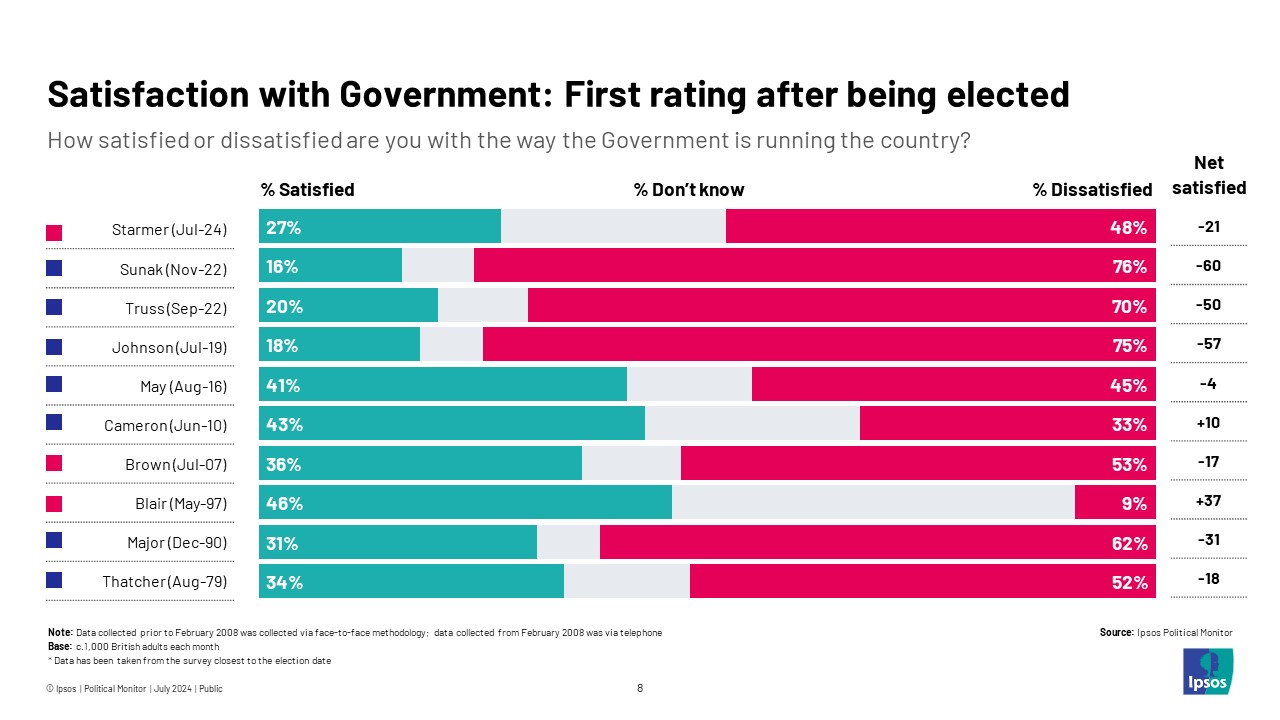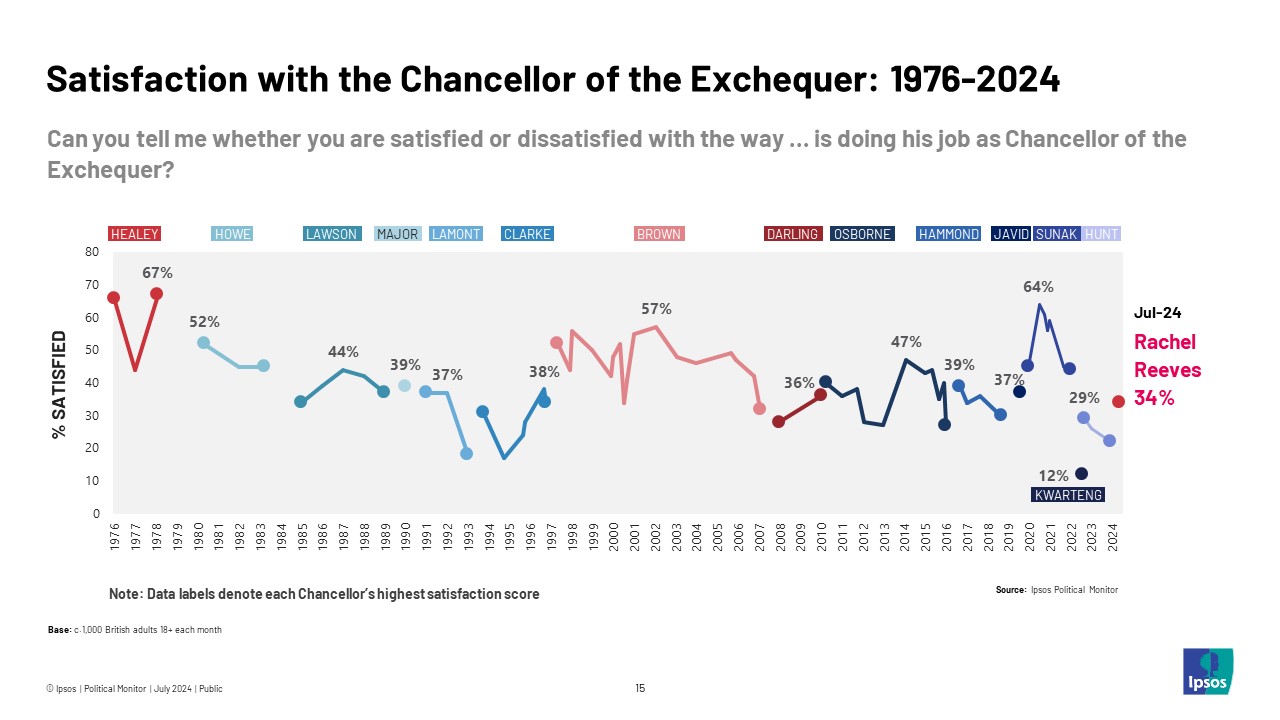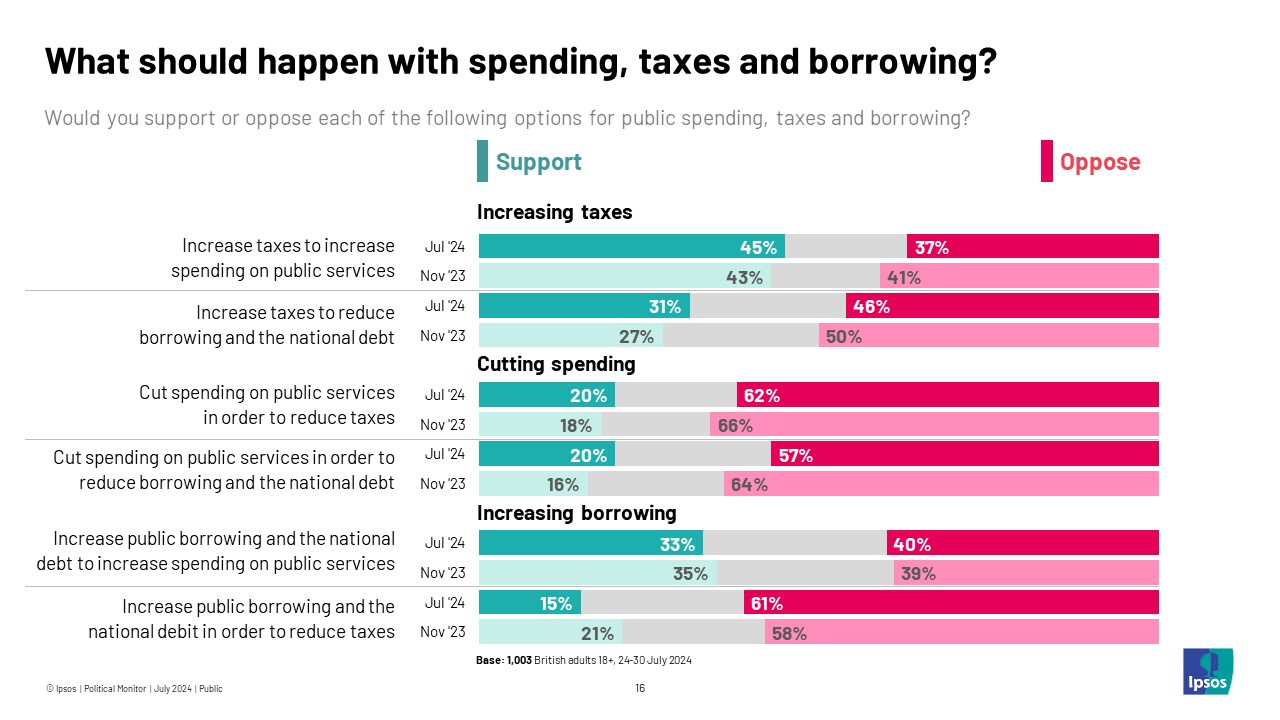Keir Starmer enjoys net positive ratings, but concern about public services remains high
- Keir Starmer enjoys net positive satisfaction ratings – but ranks lower than May, Cameron and Blair when they took office.
- Jury is out on Chancellor Rachel Reeves, with 4 in 10 unsure if they are satisfied or dissatisfied with her performance.
- Public are more optimistic about the government’s approach to the economy than they were under the previous Conservative government – but anxiety remains over the state of public services.
The latest Ipsos Political Monitor, taken 24th – 30th June 2024 (before events in Southport and the unrest started across the UK), asks the public their views on the new government, Prime Minister Keir Starmer, and the state of public services in Britain.
Leader satisfaction ratings
- Keir Starmer’s first net satisfaction rating as PM is net positive – better than recent PMs but weaker than others historically. 37% are satisfied with Starmer as PM and 30% are dissatisfied. This is the first net positive rating for an incoming PM since Theresa May. However, the percentage satisfied with Starmer (37%) is lower than figures for Theresa May (54%), David Cameron (57%), Tony Blair (65%) and Margaret Thatcher (45%) when they first took over. 33% say they don’t know what they think of Starmer as PM – suggesting that, in these early days of his government, the jury is still out.

- The public are starting with a less negative perception of this government than the previous three Conservative ones since 2019 – but other incoming governments had more overt good will. 27% are satisfied with how the government is running the country and 48% are dissatisfied – giving a net score of -21. In June, 12% were satisfied with how Rishi Sunak’s government were running the country and 83% were dissatisfied (resulting in a net satisfaction of -71). However, the current government’s net satisfaction rating of -21 is worse than the first rating for the May (-4), Cameron (+10) and Blair (+37) governments. It is similar to the first rating for Brown’s (-17) and Thatcher’s (-18) - both of which had higher satisfaction and dissatisfaction scores.

Elsewhere in the poll:
Economic optimism
- Net economic optimism is stable at -10. However, the public are more optimistic about the government’s approach to the economy than they were under the previous Conservative government. 33% expect the economy to improve in the next 12 months (+5 from June) and 43% say it will get worse (also +5). 48% expect the current government’s policies to improve the state of the economy and 43% disagree. In contrast, in November last year 25% expected the Sunak government to improve the economy and 68% disagreed.
- The jury is out on Rachel Reeves as Chancellor, with 41% saying they don’t know if they are satisfied or dissatisfied with her performance. 34% are satisfied with Reeves and 25% are dissatisfied, giving a net positive score of +9. Rishi Sunak consistently achieved higher satisfaction scores as Chancellor between 2020-22. Reeves’ satisfaction figures are comparable to Philip Hammond’s during his time in office – especially at the beginning (39% / 28% Nov 16). Looking back further, Reeves’ figures are middle of the pack when compared with previous Chancellors.

Public services and tax / spending
- Concern about public services is high, with the public slightly more likely to back tax rises to increase funds than oppose. 77% think the quality of public services has got worse in the past 5 years. Around 4 in 10 said the same in November 2012 (40%) and 2015 (42%), and 63% in March 2017. 45% would support tax increases to increase spending on public services (including 64% of 2024 Labour voters) and 37% would oppose. This approach is seen as preferable to funding increased spending on public services through increased borrowing (33% support / 40% oppose). On the other hand, cutting spending on public services is opposed by a majority regardless of whether that is to reduce taxes (62%) or reduce borrowing / the national debt (57%).
- The public are more optimistic about the future of public services and other areas of policy under Labour than they were under the previous Conservative government – though doubts remain in key areas. A majority expect the policies of the Labour government to improve Britain’s public services in the long term (52%, +33 pts from November 2023 under Sunak), 39% disagree (-36). Despite being more than twice as likely to expect the NHS to improve in the next few years today (34%) than under Sunak’s government in November (16%), a larger number expect it to continue to get worse (42%, -22 pts from November). Similarly, whilst 24% expect the cost of living to improve in the next few years, 52% think it will continue to get worse.

- In terms of future expectations, the public are more optimistic over time in other areas and more likely to think things will improve rather than get worse. This includes on improving skills in Britain’s workforce (33% better / 28% worse), public transport (32% / 24%) and opportunities for young people (37% / 33%). The public are split on whether the quality of education will improve (30% / 29%), though they are more optimistic than under the Conservatives in November (15% / 44%). Meanwhile, just 17% expect the way their area is policed to improve in the next few years (+7 from November) and 27% expect the same for the quality of the environment (+11).
![Ipsos Chart: Thinking about [these policy areas] over the next few years do you expect it to?](/sites/default/files/inline-images/expectations-of-public-services-july-2024-ipsos.jpg)
Keiran Pedley, Director of UK Politics at Ipsos, said:
Our latest Political Monitor reveals that public opinion on the new government and Prime Minister Keir Starmer is mixed. While Starmer enjoys a net positive satisfaction rating, a first for an incoming PM since Theresa May, it is lower than several of his predecessors when they first took office. The public is less dissatisfied with this government compared to the previous three Conservative ones, but their satisfaction levels are still historically lower than those enjoyed by some new governments. Notably, there is a significant level of economic optimism, with more people expecting the economy to improve in the next 12 months and expressing confidence in the government's economic policies compared to Sunak’s. However, concerns remain high around the state of public services, with a majority believing their quality has declined in recent years. Despite this, there's more optimism about the future of public services and other policy areas under Labour compared to the previous Conservative government.
Technical note
Ipsos interviewed a representative sample of 1,003 adults aged 18+ across Great Britain Interviews were conducted by telephone between the 24th to 30th July 2024. Data are weighted to match the profile of the population. All polls are subject to a wide range of potential sources of error.






